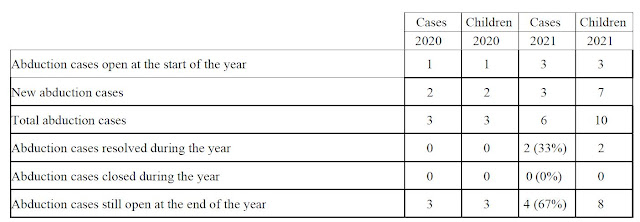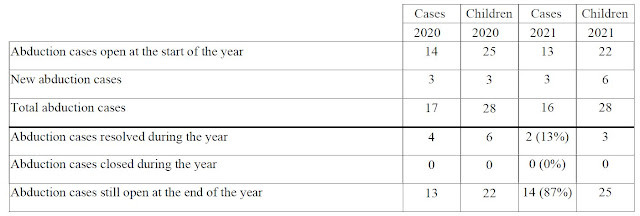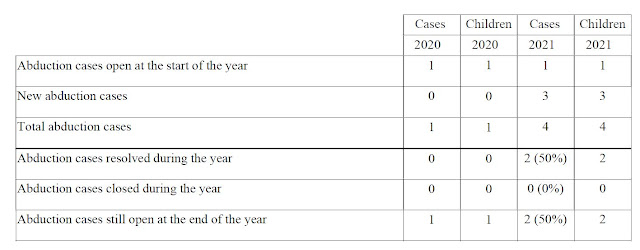By
MATTHEW M. BURKE AND
KEISHI KOJA
STARS AND STRIPES • October
19, 2022
https://www.stripes.com/theaters/asia_pacific/2022-10-19/japan-parental-child-abduction-hague-7740130.html
In the 10 years since Donny
Conway’s daughters Christina and Chihiro were taken by their Japanese mother to
her home country without his consent, he has kept their bedroom in his
California home filled with unopened Christmas presents, handwritten notes and
reams of legal documents, he said.
The former Navy petty officer second
class is one of hundreds of American parents whose children were abducted by
another parent and taken to Japan before April 2014, when it ratified the Hague
Convention on the Civil Aspects of International Child Abduction.
Some parents whose children were
abducted to Japan after the agreement was signed are finally starting to see
some progress in seeking their return, but others, like Conway, remain
forgotten.
“There’s only so much you can
achieve when it’s pretty much just sanctioned abduction,” he told Stars and
Stripes in a series of interviews in September and October. “The numbers aren’t
high enough for people to care.”
Japan is known as a “black hole” for
parental child abduction, said Jeffery Morehouse, father to an abducted son,
Atomu, and founder of Bring Abducted Children Home, a U.S.-based nonprofit.
Prior to April 1, 2014, if a Japanese parent living in the United States
returned with their child to Japan, there was very little chance the child
would be returned, or that the other parent would even be granted visitation,
Morehouse said.
Between 1994 and 2014, when the State
Department established the Office of Children’s Issues, 416 children were
abducted by parents from the U.S. to Japan, according to Bring Abducted
Children Home’s website, citing State Department data.
‘Civil legal remedy’
Japan’s western allies began
pressuring it to join the treaty, a Ministry of Foreign Affairs spokesman said
by phone during the first in a series of interviews beginning Sept. 20. The
spokesman declined to say when the first overtures were made.
The Hague Convention provides a
“civil legal remedy” for the return of children who are unjustly removed or
“retained outside their country of habitual residence” in another signatory
country, the U.S. Embassy in Japan website says. The treaty also provides a
framework to “protect legal rights of access and visitation.”
Parents like Conway were not
afforded the benefits of the Hague Convention because their cases occurred
prior to Japan joining the Hague Convention, Morehouse said.
Conway, like the other pre-Hague
parents, was able to apply for access to his children through the Hague
Convention, Conway said. The State Department facilitated his application with
Japan’s Ministry of Foreign Affairs but did little else, he added.
A State Department spokesman declined to comment on
the record for this story.
If an application is accepted, the government of Japan
connects both parents with an outside mediator and local attorneys, but their
involvement stops there, the ministry spokesman said.
Conway was granted Hague access by the ministry on
April 21, 2015, he said. He hired a Japanese attorney and traveled to Japan,
hoping to at least be able to talk to or see his daughters.
He presented the document from the ministry at city
hall in Ebina and Zama in Kanagawa prefecture. To his chagrin, they called his
ex-wife, Yumika Arima, and asked her if she would provide access to the
children, Conway said. She said no.
‘Unenforceable’
Conway’s case is typical, said
attorney Jeremy Morley, an expert in international family law based in New York
City. “All of those left-behind
parents ... are stuck without a remedy, and the Hague Convention has no
relevance to their circumstances,” he said.
Morley said their only
potential path is through Japanese civil law, but he called that route“totally
minimal and meaningless.” Visitation orders are “essentially unenforceable,” he
said.
The ministry spokesman admitted as
much. “We do our best to realize the visitation or contact, but we don’t have
enforceability,” the ministry spokesman said. It’s customary in Japan for some
government spokespeople to speak to the media on condition of anonymity.
Conway doesn’t know if the girls would
choose an American or Japanese life, but he just wants them to know they were
abducted, that they have bank accounts in America, resources and a father who
never stopped looking for them, he said.
___________________________________________________________________________________
MATTHEW M. BURKE
Matthew M. Burke has been reporting from Okinawa for
Stars and Stripes since 2014. The Massachusetts native and UMass Amherst
alumnus previously covered Sasebo Naval Base and MarineCorps Air Station
Iwakuni, Japan, for the newspaper. His work has also appeared in the Boston
Globe, Cape Cod Times, and other publications.
KEISHI KOJA
Keishi Koja is an Okinawa-based reporter/translator
who joined Stars and Stripes in August 2022. He studied International
Communication at the University of Okinawa and previously worked in education.


























